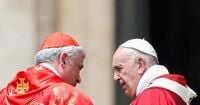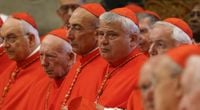In the wake of Pope Francis's death on Easter Monday, April 21, 2025, speculation is rife regarding his successor. Italian media outlets suggest that Cardinal Konrad Krajewski, the Papal Almoner and a close aide to the late pontiff, could be a strong candidate to lead the Catholic Church. His potential ascension is seen as a logical decision rather than a sensational one, given the current dynamics within the Church.
Pope Francis passed away at 7:35 AM, and his body is currently displayed in St. Peter's Basilica for public mourning. The funeral is scheduled for Saturday, April 26, 2025, at the Basilica of St. Mary Major, where he will be laid to rest. Notably, this marks the first time in 120 years that a pope will be buried outside the Vatican Grottos.
The conclave to elect the new pope must be convened between May 5 and May 10, 2025, as per Church tradition, which dictates that it should occur between 15 to 20 days after the pope's death. During this conclave, cardinals under the age of 80 will be sequestered in the Sistine Chapel, casting votes twice daily until a candidate secures a two-thirds majority. The process is shrouded in secrecy, with any breach of this confidentiality leading to severe consequences, including excommunication.
Four Polish cardinals will participate in this conclave: Stanisław Ryłko, Kazimierz Nycz, Grzegorz Ryś, and Konrad Krajewski. Cardinal Krajewski, who has held the position of Papal Almoner since August 2013, is known for his charitable work and has garnered significant public attention in Italy. His actions, such as restoring electricity to a building housing 450 residents in Rome in 2018, have cemented his reputation as a compassionate leader. This act involved removing seals from an electricity meter in a building where the utility bill had reached €300,000, a move that drew both criticism and praise.
John L. Allen Jr., a Vatican publicist, remarked in 2022 that Krajewski is "cut from the same cloth as Francis," highlighting his alignment with the late pope's vision. The Italian newspaper La Stampa recently suggested that Krajewski would be a "natural choice" for the papacy if the Church aims to continue the progressive agenda of Pope Francis. While he may not be the frontrunner, his loyalty to Francis's mission positions him as a potential compromise candidate.
Additionally, other candidates are being considered, including Cardinal Pietro Parolin and Cardinal Matteo Maria Zuppi from Italy, as well as Cardinal Luis Antonio Tagle from the Philippines. The dynamics of the conclave will largely depend on whether the cardinals seek to maintain the course set by Pope Francis or pivot towards a different direction.
Cardinal Krajewski's charitable efforts have earned him the moniker "Robin Hood of the Pope." His commitment to social justice and outreach to the poor has resonated with many, especially in light of his actions during the Ukraine crisis, where he provided humanitarian aid amidst conflict. Reflecting on his experiences in war zones, Krajewski stated, "For the first time in my life, I didn’t know where to run because it’s not enough to just run; you need to know where to go." His dedication to helping those in need has become a hallmark of his ministry.
As the Church mourns the loss of Pope Francis, the focus shifts to the future leadership. The upcoming conclave is expected to be a pivotal moment for the Catholic Church, with the potential for a significant shift in direction depending on the outcome. The election of a pope from Poland would mark a historical moment, following in the footsteps of John Paul II, who was the first non-Italian pope in over 400 years.
In the coming days, the world will watch closely as the cardinals prepare for the conclave. The decision they make will have profound implications for the Catholic Church and its followers around the globe. Will they choose to continue the legacy of Pope Francis, or will they opt for a new direction? The answer will soon be revealed as the cardinals gather to deliberate in the Sistine Chapel.
As the Church prepares for this critical juncture, many voices within the Catholic community express their hopes and concerns. Some believe that a continuation of Francis’s vision for a more inclusive and compassionate Church is essential, while others advocate for a return to more traditional values. The outcome of the conclave will ultimately reflect the collective will of the Church's leadership and its response to the challenges facing the global community.
The anticipation surrounding the conclave is palpable, and the legacy of Pope Francis will undoubtedly influence the discussions and decisions made in the coming weeks. As the world reflects on the life and contributions of Francis, the question of who will succeed him remains at the forefront of public interest.


